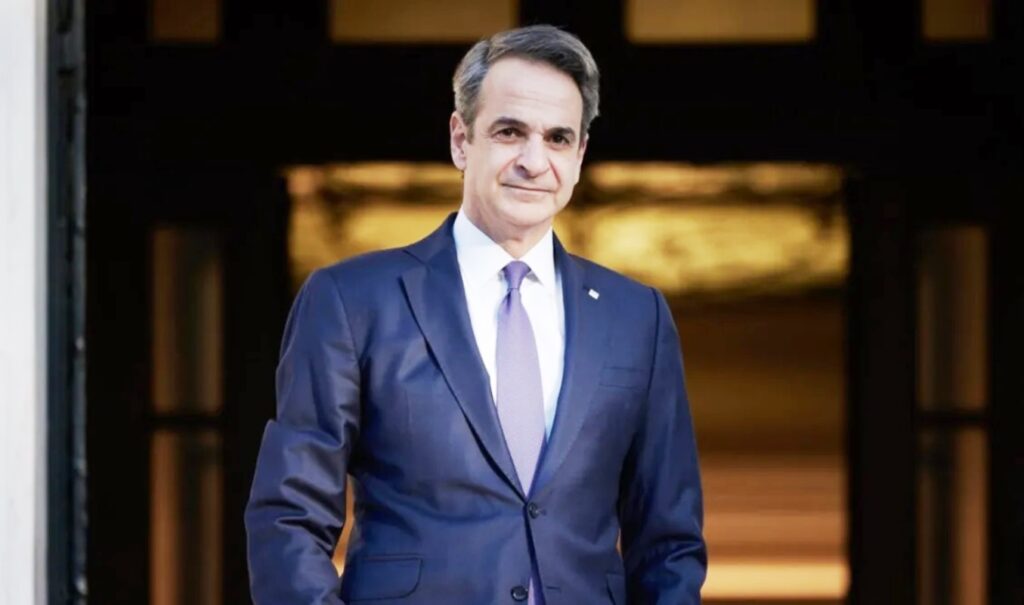Reference to immigration was made by Kyriakos Mitsotakis, who among other things in his weekly review noted that “we are not going to sit with our arms crossed” adding that “Immigration is not a temporary crisis. It is a reality that changes form, intensifies or recedes, but never ceases”.
Kyriakos Mitsotakis on immigration: “Greece will not allow the establishment of a new route for illegal entry into the country and Europe”
The Prime Minister’s full statement:
“Good morning to everyone. Today’s review begins with the major issue of immigration, which in recent days has returned as an urgent suffocating situation, this time at our southern maritime borders. For those who are rightfully concerned, I assure you that we are not going to sit with our arms crossed. We have proven this many times from 2019 to today, securing our borders at Evros, in the northern and eastern Aegean. Immigration is not a temporary crisis. It is a reality that changes form, intensifies or recedes, but never ceases. The wretched traffickers change tactics and routes, moving their operations where they find ground – and this time, that ground is Libya.
Our message is clear: Greece will not allow the establishment of a new route for illegal entry into the country and Europe. As at Evros in 2020, so now, we will do whatever it takes to stop them. We are taking emergency measures to close the route from North Africa. And in this context, we call on Libya for cooperation, after all, the neighboring country’s relationship with the European Union passes through Greece. Our stance is strict, but absolutely legal and justified. I know that many citizens feel upset and anxious. I share this feeling. I don’t hide behind numbers or statements. The pressure is real, and our response is clear: Greece will not become a free-for-all.
I change the subject, but remain in Crete, for a very important cultural development, as according to the 47th Session of the UNESCO World Heritage Committee, the Minoan Civilization is officially included in the World Heritage List. A great international recognition for a civilization that was born in Crete and left an indelible mark. Congratulations to all who worked hard for this success – at the Ministry of Culture, our Permanent Representation to UNESCO, the Region of Crete and all cooperating bodies. This recognition is also a tribute to the memory of Marianna Vardinoyannis, who believed in this vision from the first moment.
I move to this year’s European Commission Report on the Rule of Law, which confirms Greece’s steady progress in the areas of Justice, transparency, media freedom and the overall functioning of institutions. Our country is one of 12 member states that made progress on all recommendations and among the 15 with the fewest recommendations – along with Germany, the Netherlands and Portugal. According to the same report, countries like Spain, Italy, Ireland or Belgium receive more recommendations than Greece. No, we don’t claim everything is perfect. No democracy, in any country, is perfect. However, undoubtedly, the image of institutional collapse that the opposition describes for our country is not true. No. Greece is trying and making steady improvement in recent years, having fully satisfied 3 of the total 7 recommendations made to us since 2022 and making significant progress on the other 4.
According to this year’s Report, Greece no longer has pending recommendations regarding timely and effective consultation in the legislative process, strengthening judicial independence and monitoring asset declarations. Significant improvement is noted in the protection of media and journalists, based on the Memorandum of Understanding that has been adopted and taking into account European standards. At the same time, progress is recorded in combating corruption, partial improvement in structured dialogue with NGOs and the positive contribution of Recovery Fund reforms and investments to justice administration and the rule of law is recognized. Beyond the positives it highlights, the Report emphasizes the need for faster implementation of reforms. This is what we will do. The fight for a better and more quality democracy is continuous.
In a similar direction of rationalization and transparency is our initiative to clear the lists of public Universities from inactive students, enrolled since the 1950s and 1960s. The regulation is fair, with logic and sensitivity. No one claims this is some earth-shattering reform. However, we must consider why no government until now has done the obvious and we are the first to do this too. We give a second chance to about 35,000 students who demonstrably want to complete their studies, having passed 75% of their courses and participated in exams at least twice in the last two years. About 290,000 inactive students will be removed from the registers, as they don’t meet the above criteria and their presence distorts the real picture of the student community. Special provisions are made for those who, due to health problems, find it difficult to complete their studies, such as people with disabilities over 50%. Also, parents of children up to 8 years old, employees working more than 20 hours a week, champions and athletes with intensive programs will not be removed. For the first time we will have a substantial picture of who are the students who actually attend, so that Universities can know exactly to whom they are addressing and make their educational planning.
For the first time, also, our government was the one that proceeded to evaluate public services by the citizens themselves. From tomorrow, the evaluation of services provided by public hospitals by patients also begins. So, those who are discharged will rate, in real time, their experience: from infrastructure and cleanliness, to waiting time, care from medical and nursing staff and support during discharge from the hospital. The evaluation will be done digitally through IDIKA, by sending SMS and responding to a specific questionnaire: 35 questions in 8 areas, with “Yes” or “No” answers. For now, pediatric, psychiatric and oncology cases are excluded from the process, for which three different and specialized questionnaires will be activated by the end of 2025. This is not a simple poll or opinion recording. It is a tool that will allow both administrations and the Ministry of Health to have an accurate picture of what is going well and what is not, so they can intervene to improve the situation where needed. Hospitals with good performance will be rewarded, while those that consistently record low evaluation and do not improve, will face consequences. The state, for its part, has the obligation to ensure the necessary resources, staff and infrastructure, so that no facility falls behind due to objective deficiencies.
I remain in the field of public health with the new, updated data from the National Preventive Examinations Program “PROLAMVANO”. Already, more than 3.6 million citizens have benefited from the free preventive examinations that the state offers for the first time and which, for many, proved life-saving. It is a personal challenge for me to change the culture around prevention and make it part of our daily lives. And I believe we have succeeded to some extent. In the coming period we will include in the program an action for the prevention and treatment of adult obesity, as well as kidney dysfunction.
In the same direction, of care that provides and facilitates, is the new program “Home Accessibility”, worth 24 million euros, which is part of the “Support for People with Disabilities” Action of the National Plan “Greece 2.0”. Beneficiaries are 2,500 people with a disability percentage above 67%, who legally reside in Greece and have an individual income up to 60,000 euros. The subsidy starts from 5,000 and reaches 14,500 euros, depending on the type of disability, and covers technical works for adapting their homes, such as installing ramps, lifts or other special equipment. It is one of our actions that contributes to independent living and equal participation of our fellow citizens with disabilities in social and professional life. Interested parties will submit participation applications, along with the necessary documents, through a digital platform that will open very soon.
We listen to the needs of people with disabilities and seek, through dialogue with the disability movement, solutions to facilitate their daily lives, utilizing every available resource. Thus, together with the above action, we succeeded in including three more important actions worth 232.4 million euros in the budget of the new European Funds that I told you about in the previous review. The first action concerns the procurement of 210 electric buses for transporting 12,000 students with disabilities and installing charging infrastructure in special schools. The second includes subsidizing electric wheelchairs and equipment for converting manual to electric ones, with about 15,000 beneficiaries with tetraplegia, paraplegia or hemiplegia. And the third action aims at the energy upgrade of 478 special schools. We continue with plan and consistency, to strengthen the autonomy and daily life of thousands of our fellow citizens who need it. For “A Greece with everyone, for everyone”.
I will continue with another program, this time supporting entrepreneurship. This is the new action “Extroversion of Small and Medium Enterprises”, with a total public expenditure of 200 million euros. Application submission begins on July 17 and beneficiaries are existing very small, small and medium enterprises throughout the country for business plans that will enhance their extroversion. The minimum investment amount is 80,000 euros and the grant reaches up to 200,000 euros, covering 40% to 50% of the cost, depending on the area and size of the business. We try not to leave anyone behind. We have proven in practice that we support entrepreneurship. That’s why we also want to see investments being implemented in practice. Not just on paper. At least 1,400 cases of investment projects that were subsidized but never proceeded were identified, based on the development laws of 2004 and 2011. We are proceeding with their delisting and the recovery of 480 million euros, with interest. It is a matter of justice towards those who actually invest and support the economy in practice.
I mentioned Evros earlier, on the occasion of what is happening these days in Crete, recalling the unprecedented events in spring 2020 at our northeastern borders. Apart from the fence to prevent a similar invasion attempt, the plan for restructuring and supporting this sensitive area includes the renovation of the Kipoi Border Station. The project contract was signed recently, with the contractor committed to deliver the new border station next summer. Significant improvements will be made to existing buildings and a new independent control line for international commercial transport vehicles will be created, which means facilitating cross-border movements and trade from the specific area that constitutes the southeastern land gateway to Europe.
Not everything changes at the speed we want and pursue, but in many sectors significant steps are being taken that bring results, such as in waste management. According to Eurostat, Greece “climbed” six places in the European ranking regarding waste management. Today 13 waste processing units operate compared to 3 in 2019 and another 25 are being built, many of which will be delivered within 2026. We haven’t reached where we want yet, we are far from the goals we set ourselves. We continue even more intensively. In the coming weeks we will announce a major reform in recycling, but I won’t tell you more about it yet. A little patience!
A word about the experimental 24-hour operation of all Mass Transport Means last Saturday. The measure, at least in the pilot phase, seems to have succeeded: 70 buses operated with 490 routes, 26 routes were added to the Metro and 30 to the tram, while the number of passengers exceeded 50,000. Let me say again a big thank you to the workers who helped make this social action a reality for the safe return home of those who went out for entertainment. Our goal, as I said, is, after evaluating the data and seeing what needs improvement, to proceed from September to permanent implementation of the measure every Saturday.
I close with the “five Cultural Routes”, five proposals for touring monuments and cultural sites, in areas with natural attractions and tourist interest throughout Greece. From the monumental works of Cyclopes and humans during the Mycenaean era (2nd millennium BC), on the road to the West from Homer to Cervantes, in the Steps of Apostle Paul, on the Cultural Egnatia Road, to the Network of Castles from Byzantium to the Ottoman era, the routes are accompanied by thematic narratives covering all periods of Greek history from the Mycenaean Era through Byzantium to the Ottoman era. They were designed by the relevant directorates of the Ministry of Culture and will be implemented with 50 million from the Recovery Fund. It is a particularly effective tool of cultural diplomacy, but also local development, as lesser-known archaeological sites with small visitorship until now are highlighted.
Another review has reached its end. I hope you found something in it that interested you. See you next Sunday, good morning!”




